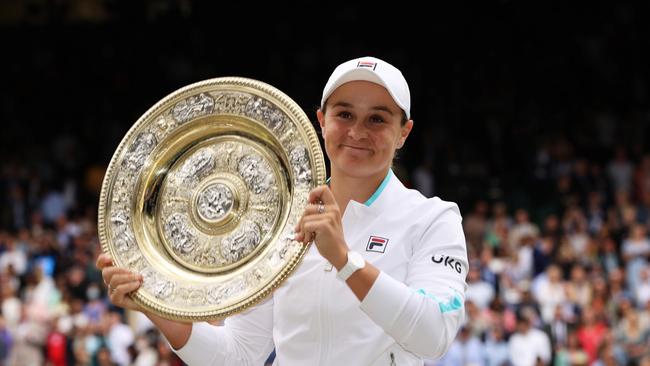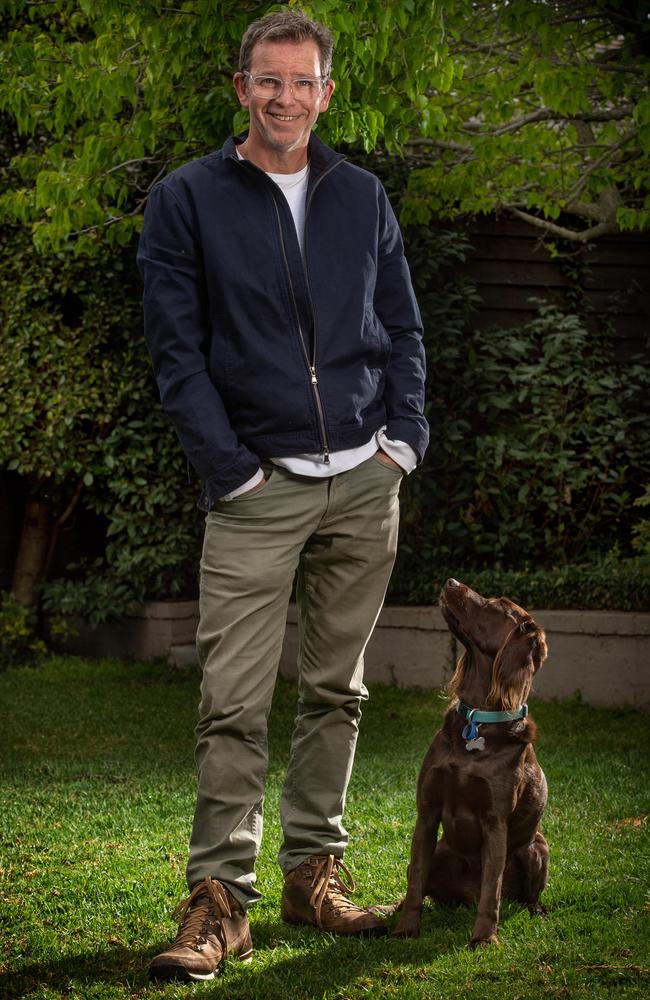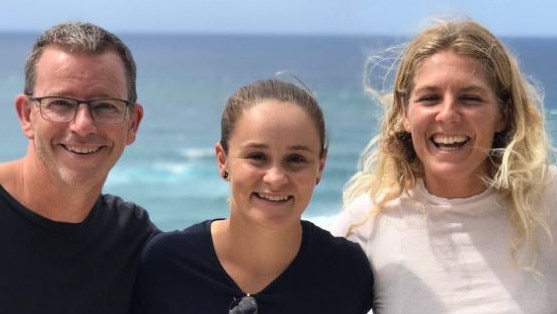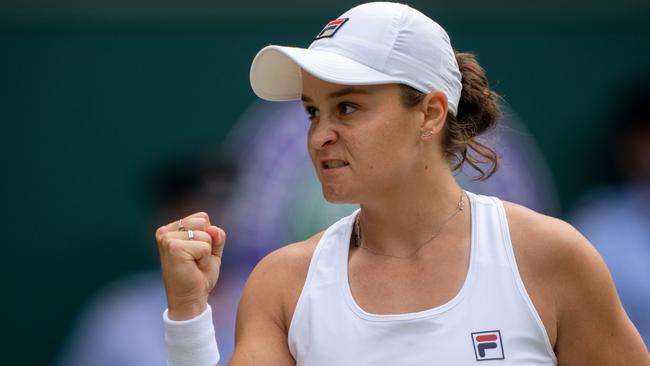Ash Barty’s mindset coach Ben Crowe’s message about kindness
Mindset coach Ben Crowe helped Aussie tennis star Ash Barty win Wimbledon. Now he wants to change all of our lives — through kindness.
Lifestyle
Don't miss out on the headlines from Lifestyle. Followed categories will be added to My News.
If you ask Ben Crowe, kindness is one of the most important issues on the planet right now. The mindset coach behind Ash Barty’s Wimbledon win, Crowe says Australians are living through the most opinionated, judgmental society in living history and today, on World Kindness Day, he has called for it stop.
“With everyone having these opinions and judgments and spreading negativity around, comparing ourselves and so forth, there is a great need to shift that perspective and to develop compassion and kindness and empathy and love,” he said.
“For me, it’s the No.1 issue on the planet right now.
“We are so freaking hard on ourselves as a human race with this reptilian brain, with this negative bias — it’s like velcro for negative shit and teflon on the positive side.

“I’ve never seen the world so distracted as what it is right now, and my hypothesis on what’s going on is – if you could accept yourself 100 per cent unconditionally – ‘This is who I am, these are the cards I’ve been dealt, this is my life’ – and celebrate who you are unconditionally, then you can have confidence in yourself.
“And if you have confidence in yourself you can have confidence in others, and then you can contribute to their happiness, by being kind.
“But if you don’t accept yourself, you won’t have confidence in yourself and you’ll start to see others, not as your comrades, but as your competitors.”
So take away the competition, and how does Crowe instil the desire to win in clients and champions such as Barty, Dylan Alcott and surfer Stephanie Gilmore?
“Every human on the planet is balancing courage with consideration, and courage to push yourself out of your comfort zone to go as far as you can go with whatever gifts you’ve been given, whether you’re a tennis player, a writer or a doctor,” he said.
“At the end of the day, it’s not about you, it’s about the impact you can have on someone else’s life — to care about them, to serve them, to love them, to be interested, not interesting — and to balance those two worlds, sometimes we need to separate the person from the persona.
“Separate your self worth from your business card, or the human being versus the human doing.
“So Ash Barty the tennis player, is an absolute warrior. She’s a competitor. She’s the most competitive person I’ve ever met and it’s a competitive advantage for her to have that absolute desire to see what she’s capable of and compete with.
“But as soon as she walks off the court, she’s also the most beautiful, humble, respectful, caring, kind human being you’ll ever meet as well.
“And when you can separate those worlds and that perspective, work on your mindset on the field in a professional sense, with your perspective off the field in a personal sense, you can get that balance between happiness and confidence.”

According to research released today by The Kindness Factory, a third of Aussies are more aware of the impact of loneliness and sensitive to the challenges faced by others since living through the pandemic.
Since Covid struck, over a quarter of Aussies admit they now acknowledge others more, with 28 per cent placing more emphasis on helping others, and one in five giving back and connecting more deeply with people.
It can be as small as a smile. A compliment. Asking someone how they are, and taking the time to listen. Starting a meaningful conversation or standing up for something or someone you believe in — it all makes you feel good. And that’s the first step to a more positive life, Crowe says.
“For me, it’s very much compassion with no strings attached, which is another way of saying that is just unconditional love,” he continued.
“But it also needs to start with ourselves, first and foremost.
“I studied anthropology at school and I found it absolutely fascinating because Charles Darwin and the theory of evolution became a certain narrative of survival of the fittest and survival of the strongest. But his work was misinterpreted, and it was actually survival of the kindest. In Charles Darwin’s own words he says ‘co-operation is more important than competition in humanity’s evolutionary success, and that compassion is the reason for both the human race’s survival, and its ability to continue to thrive as a species’.
“That has challenged our whole perspective to stop comparing ourselves against each other and find that element of kindness for each other.
“We’re often hoping we’ll find our self-worth externally and we’re just getting distracted by extrinsic motivations.

“And the big five are money and materialism, corporate status – so once I get that promotion, then I’ll be worthy – or social status – once I’m recognised or famous, then I’ll be enough.
“And the first one is craving recognition around what others are thinking and saying about us, rather than (what) I think about myself.
“One of the pillars for kindness is being humble and curious and the things that Ash Barty and Dusty Martin and Steph Gilmore, Andre Agassi are – they’re phenomenally kind because they’re humble and curious, and they have this purpose mindset.
“They go through their day with this philosophy or this curiosity of ‘how can I be the best part of someone else’s day today’ and because they’re famous, sometimes that’s the simplicity of smiling and saying thank you, or calling someone by their name. That can make someone feel 10 foot tall.”
Crowe said waking up in the morning and writing a To Be list instead of a To Do list was a great place to start.
“In the height of Covid we asked our clients what the world was trying to say to us … and they all said it was telling us to do less and be more,” he said.
“I think we’re coming out the other side (thinking) ‘I’ve had a taste for what it means to be a human being, to stop and breathe and listen, and I want a little bit more of that’.”
When it comes to the top acts of kindness of 2021, giving compliments, being kind to yourself and asking others if they need help lead the charge.

Proving the enormity of these small acts, three per cent of people said the kindness of others during the pandemic actually saved their lives.
“Covid has tested us all but it’s also been the year that kindness has prevailed,” said Kath Koschel, founder of the Kindness Factory, the organisation which has surpassed three million acts of kindness.
“We have witnessed a 60 per cent increase of acts of kindness logged on our website … and this momentum needs to continue, as kindness is both life changing and life saving.
“If kindness saves one life, then our mission is working. I have read every single logged act to date.
“The stories, some that produce a smile and some that bring tears, all have one thing in common, human connection.
“We were born to connect and what better way to do that than via kindness.”
Ben Crowe’s top tips for enhancing your life with kindness
● Practise self-compassion: We first need to be kind to ourselves before we can be kind to others.
● Unlock a purpose mindset: Start the morning by asking yourself: “How can I be the best part of someone else’s day today?”
● Think of kindness as a language.
● Pay it backward: One of our favourite random acts of kindness is to shout the person behind you a coffee without telling them, and then watch the impact it has on them and you for the rest of the day.
● Celebrate essential workers.
● Log your act of kindness by using social media hashtag #onesmallact or visiting kindnessfactory.com





